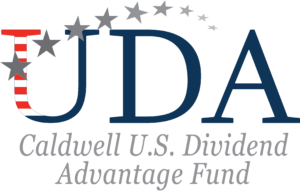For the month of October, the Caldwell U.S. Dividend Advantage Fund (“UDA” or “the Fund”) gained +8.0% versus a gain of +7.3% for the S&P 500 Total Return Index (“Index”)1. At the sector level, top performers were Energy, Industrials, and Financials, whereas Communication Services, Consumer Discretionary, and Real Estate were relative underperformers. The Fund’s performance benefitted from overweight positions in the Energy and Industrials sectors. The Real Estate sector continued to suffer due to the rising interest rate environment as the yields offered become relatively less attractive.
Top performers in the month of October were Devon Energy (“DVN”, +27.7%), Booz Allen Hamilton (“BAH”, +17.0%), and Northrop Grumman (“NOC”, +15.9%). DVN rallied more or less in-line with the constituents of the oil and gas industry, supported by a surge in global energy prices during the month. BAH’s performance was reinforced by a positive earnings surprise and raised guidance. Moreover, there was strong booking and hiring momentum setting the company up to reach the top end of its guidance for next year. NOC’s prospects continue to benefit from robust demand stemming from the heightened global security threat environment.
During the month of October, the Fund initiated positions in Carlisle Companies (“CSL”) and Valmont Industries (“VMI”). CSL is a diversified and global manufacturer of engineered products operating through the segments of Construction Materials, Weatherproofing Technologies, Interconnect Technologies, and Fluid Technologies. A combination of constrained industry supply, strong pricing power and robust demand for replacement commercial roofing should support solid top line growth and margin expansion for the foreseeable future. VMI is a diversified producer of products and services for Infrastructure and Agricultural markets. Food security concerns and high grain prices ensuing the Russia-Ukraine conflict continue to ensure heightened demand for the Agriculture segment, while clean energy initiatives, road building, and the 5G rollout are yielding favourable conditions for the Infrastructure segment.
While we remain mindful of the macro environment, the Fund employs a bottom-up investment approach designed to seek out attractive investment opportunities in any market. Over the long run, given its unique momentum-driven investment approach and focus on well-managed, dividend growth companies, we believe UDA is well positioned to provide strong performance by way of both attractive regular monthly distributions and long-term capital appreciation potential. We expect that our approach to dividend growth investing should continue to provide a means of generating compelling risk-adjusted returns for our investors over the long term.
1All returns (for the fund, individual stocks and sectors) are in total return, Canadian dollar terms. All fund returns are in respect of Series F.
Standard performance as at October 31, 2022:
Caldwell U.S. Dividend Advantage Fund Series F: 1 Year: 5.8%, 3 year: 11.5%, 5 year: 10.0%, Since Inception (June 19, 2015): 9.5%.
S&P500 Total Return Index: 1 Year: -6.0%, 3 year: 11.6%, 5 year: 11.7%, Since Inception (June 19, 2015): 12.2%.
2Actual investments, first purchased: DVN 10/25/2021, BAH 2/28/2022, NOC 1/7/2022.
All data is as of October 31, 2022 sourced from Morningstar Direct or S&P Capital IQ, unless otherwise indicated. Fund returns are from FundData. UDA, Index total return numbers, sector returns and individual stocks returns are in CAD terms. The Fund was first offered to the public as a closed-end investment since May 28, 2015. Effective November 15, 2018 the Fund was converted into an open-end mutual fund such that all units held were redesignated as Series F units. Performance prior to the conversion date would have differed had the Fund been subject to the same investment restrictions and practices of the current open-end mutual fund.
The information contained herein provides general information about the Fund at a point in time. Investors are strongly encouraged to consult with a financial advisor and review the Simplified Prospectus and Fund Facts documents carefully prior to making investment decisions about the Fund. Commissions, trailing commissions, management fees and expenses all may be associated with mutual fund investments. Rates of returns, unless otherwise indicated, are the historical annual compounded returns including changes in unit value and reinvestment of all distributions and do not take into account sales, redemption, distribution or optional charges or income taxes payable by any unitholder that would have reduced returns. Mutual funds are not guaranteed; their values change frequently and past performance may not be repeated. The payment of distributions should not be confused with a fund’s performance, rate of return or yield. If distributions paid are greater than the performance of the fund, your original investment will shrink. Distributions paid as a result of capital gains realized by a fund, and income and dividends earned by a fund, are taxable in your hands in the year they are paid. Your adjusted cost base (“ACB”) will be reduced by the amount of any returns of capital and should your ACB fall below zero, you will have to pay capital gains tax on the amount below zero.
Publication date: November 11, 2022.
